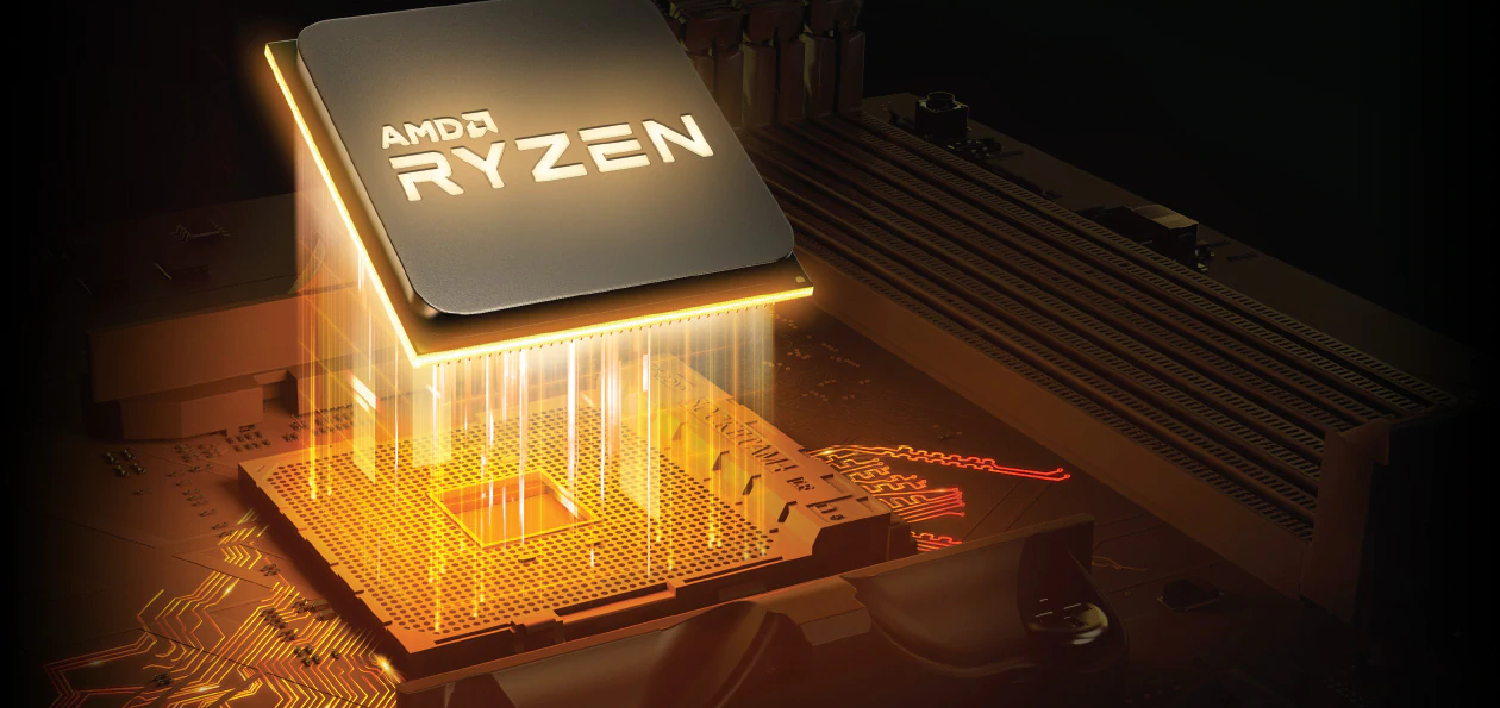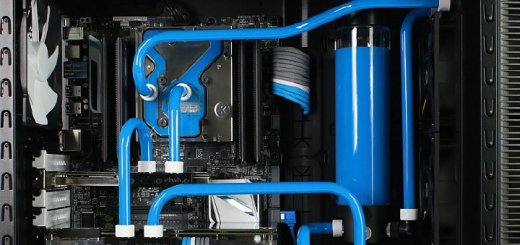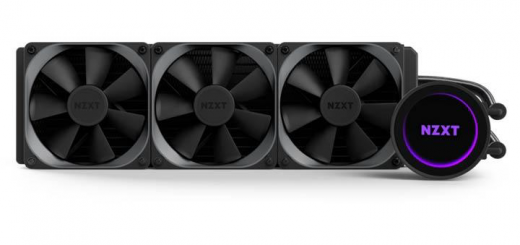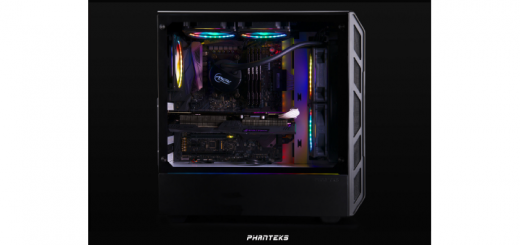AMD B550 motherboards are now available for purchase from retailers and etailers. They were introduced a few weeks back. AMD also announced A520 motherboards and Ryzen 3000XT CPUs.
AMD B550 Motherboards
AMD’s new B550 motherboards bring PCIe® 4.0 to the mainstream segment. Users can run a GPU and a storage drive at PCIe 4.0 speeds. The chipset itself does not support PCIe 4.0, and the 20x usable PCIe® 4.0 lanes are direct from the processor (16x for GPU and 4x for primary M.2 storage). Motherboard manufacturers may split the 16x GPU PCIe 4.0 lanes (32Gbps) into two PCIe 4.0 x8 slots (16GBPS each) for supporting SLI.
AMD’s B550 chipset itself has 10 PCIe Gen 3.0 lanes and no PCIe 4.0 lanes. It supports 4 SATA III (6Gbps) ports by default, while two more SATA ports may be added by reconfiguring two of the ten PCIe Gen 3.0 lanes. The motherboards may have up to two USB 3.2 Gen 2 (Superspeed 10Gbps) ports, up to two USB 3.2 Gen 1 (5Gbps) ports, and up to six native USB 2.0 ports, depending on the configuration.

AMD B550 vs. X570, B450 Chipsets
In comparison, the X570 chipset has 16 PCIe Gen 4.0 lanes instead. It supports four SATA III (6Gbps) ports, up to eight USB 3.2 Gen 2 (Superspeed 10Gbps) ports, and up to four native USB 2.0 ports in its default configuration. Motherboard manufacturers may reconfigure the X570 chipset to add up to 12 SATA III (6Gbps) ports as well as reduce the number of USB 3.2 Gen 2 (Superspeed 10Gbps) ports for adding USB 3.2 Gen 1 (5Gbps) ports.
| Chipset Name | X570 | B550 | X470 | B450 |
|---|---|---|---|---|
| Chipset Link | PCIe 4.0 x4 | PCIe 3.0 x4 | PCIe 3.0 x4 | PCIe 3.0 x4 |
| PCIe Gen 4.0 | 16 | 0 | 0 | 0 |
| PCIe Gen 3.0 | 0 | 10 (2 reconfigured as SATA) | 0 | 0 |
| PCIe Gen 2.0 | 0 | 0 | 8 | 6 |
| SATA III (6Gbps) | 4 | 4 | 4 | 2 |
| eSATA | 0 | 0 | 2x (or 4x SATA) (or x4 NVMe Gen 3) | 2x (or 4x SATA) (or x4 NVMe Gen 3) |
| USB 3.2 Gen 2 10Gbps | 8 | 2 | 2 | 2 |
| USB 3.2 Gen 1 5Gbps | 0 | 2 | 6 | 2 |
| USB Native 2.0 480Mbps | 4 | 6 | 6 | 6 |
When comparing the B550 chipset to the B450 chipset, the latter has six PCIe Gen 2.0 lanes. There are two SATA III (6Gbps) ports and two eSATA (SATA Express) ports, which can be converted into four additional SATA ports, taking their total to six. B450 chipset also supports up to two USB 3.2 Gen 2 (Superspeed 10Gbps) ports, up to two USB 3.2 Gen 1 (5Gbps) ports, and up to six native USB 2.0 ports.
AMD B550 Motherboard Prices – Why They Cost More?
When comparing the prices of B550 and B450 motherboards, the latest mainstream offerings are quite a bit expensive as compared to the existing products. Some of them have a price tag comparable to X570 motherboards. The most basic of the models cost around $100-$130, while a few flagship B550 models touch almost $300.
MSI’s B450 Tomahawk is one of the bestselling AM4 motherboards that was launched at a price of $120. In comparison, MSI B550 carries a price tag of $179 at launch, which is 50% more expensive than its predecessor. However, there are a few significant differences when comparing the features of the two motherboards.
- B550 uses 6-layer PCB while B450 in on a 4-layer PCB.
- MSI B550 Tomahawk has a 2.5G LAN in addition to a 1G LAN, whereas B450 Tomahawk comes with only 1G LAN.
- It uses Realtek’s ALC1200 Codec for audio instead of the ALC892 Codec found on B450 Tomahawk.
- B550 has a Display Port and an HDMI port, while B450 comes with a DVI-D port besides an HDMI port.
- B550 Tomahawk has two extra SATA ports from the chipset compared to B450’s four SATA ports.
The increased prices of the newer motherboards can be attributed to the richer set of features, especially the use of a 6-layer PCB and better VRAM configurations. Most of them have a VRM configuration similar to X570 motherboards and can run even a 16-core CPU with ease.
However, another reason behind their high prices may be due to motherboard manufacturers having a large inventory of B450 motherboards. They may want to get rid of their existing B450 stock. People might opt for B550 motherboards if they were priced close to B450 motherboards. We may see their prices come down as B450 goes out of stock.
Also, AMD may be planning to replace the B450 motherboards with its A520 motherboards. The company may improve the feature set on A520 motherboards and provide affordable alternatives for budget-conscious buyers. However, we will only be able to confirm all of these opinions with time.
AMD B550 Motherboard Lists and Prices
Here is a list of AMD B550 motherboards available from ASUS, MSI, Gigabyte, and ASRock. There may be some models in addition to these that might not have been released yet.
ASUS B550 AM4 Motherboards and Prices
ASUS has some of the most expensive B550 motherboards. The company has quite a few motherboards in M-ATX and couple in ITX form factors.

| ASUS ROG STRIX B550-E GAMING | $279.99 |
| ASUS ROG STRIX B550-I GAMING | $229.99 |
| ASUS ROG STRIX B550-F GAMING WI-FI | $209.99 |
| ASUS ROG STRIX B550-F GAMING | $189.99 |
| ASUS TUF GAMING B550M-PLUS WI-FI | $179.99 |
| ASUS TUF GAMING B550-PLUS | $169.99 |
| ASUS TUF GAMING B550M-PLUS | $159.99 |
| ASUS PRIME B550-PLUS | $149.99 |
| ASUS PRIME B550M-A WI-FI | $149.99 |
| ASUS PRIME B550M-A | $134.99 |
ASRock B550 AM4 Motherboards and Prices
ASRock takes the crown for the cheapest B550 motherboard with its B550M-HDV priced at $79.99 but also has the most expensive B550 motherboard, the B550 Taichi costing $300.

| ASRock B550 Taichi | $299.99 |
| ASRock B550 PG Velocita | $219.99 |
| ASRock B550 Phantom Gaming-ITX/ax | $199.99 |
| ASRock B550 Extreme 4 | $184.99 |
| ASRock B550 Steel Legend | $179.99 |
| ASRock B550M Steel Legend | $154.99 |
| ASRock B550 Pro4 | $134.99 |
| ASRock B550 Phantom Gaming 4/ac | $124.99 |
| ASRock B550 Phantom Gaming 4 | $114.99 |
| ASRock B550M Pro4 | $114.99 |
| ASRock B550M-ITX/ac | $129.99 |
| ASRock B550M-HDV | $79.99 |
Gigabyte B550 AM4 Motherboards and Prices
Gigabyte has some of the cheapest B550 motherboards at the low end. They have a couple of models below $100. However, all of their motherboards priced below $160 use a 4-layer PCB.

| GIGABYTE B550 AORUS Master | $279 |
| GIGABYTE B550 VISION D | $259.99 |
| GIGABYTE B550 AORUS PRO AC | $189 |
| GIGABYTE B550I AORUS PRO AX | $179 |
| GIGABYTE B550 AORUS PRO | $179 |
| GIGABYTE B550 AORUS ELITE | $159 |
| GIGABYTE B550 GAMING X | $139 |
| GIGABYTE B550M AORUS PRO | $129 |
| GIGABYTE B550M AORUS ELITE | $109 |
| GIGABYTE B550M GAMING | $99 |
| GIGABYTE B550M DS3H | $94 |
MSI B550 AM4 Motherboards and Prices
MSI has a diverse range of B550 AM4 motherboards, with most of them using a 6-layer PCB. Their cheapest offering is the $119 B550M PRO-DASH, while the MSI MPG B550 Gaming Carbon WI-FI costs $219.

| MSI MPG B550 Gaming Carbon WI-FI | $219 |
| MSI MPG B550 Gaming Edge WI-FI | $189 |
| MSI MPG B550I Gaming Edge WI-FI | $199 |
| MSI MPG B550 Gaming Plus | $149 |
| MSI MAG B550 Tomahawk | $179 |
| MSI MAG B550M Mortar WI-FI | $169 |
| MSI MAG B550M Mortar | $159 |
| MSI MAG B550M Bazooka | $139 |
| MSI B550-A Pro | $139 |
| MSI B550M PRO-VDH WI-FI | $129 |
| MSI B550M PRO-DASH | $119 |
Should You Buy a B550 Motherboard?
The pricing of B550 motherboards may have been a big bummer had AMD not backtracked on ZEN 3 support for its X470 and B450 motherboards. As X470 and B450 motherboards will have ZEN 3 support, it gives the consumers a cheaper alternative.
The major advantage of B550 motherboards over B450 motherboards is the availability of PCIe Gen 4.0 lanes for a graphics card and single M.2 storage. The fastest graphics card today, the Nvidia 2080 Ti, does not saturate a PCIe Gen 3.0 16x slot. At this point, it is impossible to say if next-generation high-end GPU models will bottleneck a PCIe Gen 3.0 16x slot. But we can assume that most mainstream cards, in the same class as RTX 2070 Super or RX 5700XT, will be fully utilized on a PCIe Gen 3.0 16x slot. Most buyers will probably go for a mainstream GPU and should be fine with a PCIe Gen 3.0 16x slot, and hence B450 motherboards.
When it comes to storage, mainstream users and gamers rarely use a PCIe Gen 4.0 storage device. However, content creators may prefer a PCIe Gen 4.0 storage support. Consider B550 if you want a single PCIe Gen 4.0 storage device.
A disadvantage of B550 motherboards is that they will not support Ryzen 3000 Series APUs (3200G and 3400G), Ryzen 2000 Series, and Ryzen 1000 Series. If you own or are buying a Ryzen 2000 CPU (due to a significant discount), then you will need to buy a B450 or an X570 motherboard. Otherwise, you may have to upgrade your non-supported CPU additionally when buying a B550 motherboard.
Also, B450 motherboards may not have adequate power for running an overclocked 12-core or 16-core CPU as most of their power delivery was designed for up to an eight-core CPU. If you are planning to buy a 12-core or 16-core CPU, then consider a B550 motherboard.
Buy a B550 Motherboard If You
- Want PCIe Gen 4.0 support for storage.
- Are opting for a 12-core or 16-core CPU.
- May buy the flagship GPU of the next generation.
- Don’t want an actively-cooled chipset.
- Want a hassle-free future upgrade path.
Buy a B450 Motherboard If You
- Own or will buy a Ryzen 2000 CPU or Ryzen 3000 APU.
- Are on a tight budget or buying a budget CPU.
- Don’t need PCIe Gen 4.0.
Buy an X570 Motherboard If You
- Will be using multiple PCIe Gen 4.0 devices like storage drives, capture cards, etc., that require a high-bandwidth.
- Have or are buying a Ryzen 2000 processor or Ryzen 3000 APU but want the ability to upgrade to a ZEN 3 product in the future.
- Want an SLI or Crossfire setup with two GPUs.
B550 can be considered as a passively-cooled and slightly affordable X570 alternative. The chipset offers most functionalities except PCIe Gen 4.0 support for add-on devices. If you are going to use multiple PCIe Gen 4.0 devices, then consider an X570 motherboard. Otherwise, for most users, B550 motherboards are the obvious choice.
AMD A520 Motherboards Announced
Besides launching B550 motherboards, AMD also announced its budget-oriented A520 motherboards. The company stated that more than 40 models based on the A520 chipset are in development. They will be ideal for people who want entry-level options for their offices, media centers, or HTPCs. AMD has confirmed that the A520 motherboards will be available in August of 2020.
The press release stated that “These AMD 500 Series motherboards including the new A520 provide essential performance for 3rd Gen AMD Ryzen processors and beyond.”





